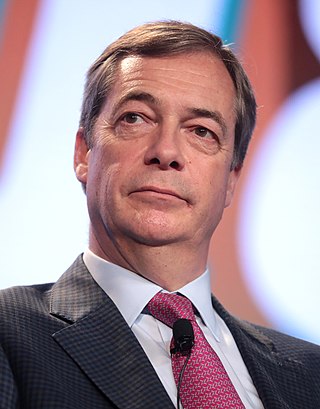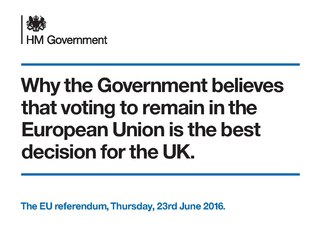An online petition is a form of petition which is signed online, usually through a form on a website. Visitors to the online petition sign the petition by adding their details such as name and email address. Typically, after there are enough signatories, the resulting letter may be delivered to the subject of the petition, usually via e-mail. The online petition may also deliver an email to the target of the petition each time the petition is signed.

Article 50 of the Treaty on European Union (TEU) provides for the possibility of an EU member state leaving the European Union "in accordance with its own constitutional requirements".

The 2016 United Kingdom European Union membership referendum, commonly referred to as the EU referendum or the Brexit referendum, was a referendum that took place on 23 June 2016 in the United Kingdom (UK) and Gibraltar under the provisions of the European Union Referendum Act 2015 to ask the electorate whether the country should continue to remain a member of, or leave, the European Union (EU). The result was a vote in favour of leaving the EU, triggering calls to begin the process of the country's withdrawal from the EU commonly termed "Brexit".

Brexit was the withdrawal of the United Kingdom from the European Union.

The European Union Referendum Act 2015 was an act of the Parliament of the United Kingdom that made legal provision for a consultative referendum to be held in the United Kingdom and Gibraltar, on whether it should remain a member state of the European Union or leave the bloc altogether. The bill was introduced to the House of Commons by Philip Hammond, Foreign Secretary on 28 May 2015. Two weeks later, the second reading of the Bill was supported by MPs from all parties except the SNP; the bill subsequently passed on its third reading in the Commons on 7 September 2015. It was approved by the House of Lords on 14 December 2015, and given Royal Assent on 17 December 2015. The Act came partly into force on the same day and came into full legal force on 1 February 2016.

The 2019 European Parliament election was the United Kingdom's component of the 2019 European Parliament election. It was held on Thursday 23 May 2019 and the results announced on Sunday 26 and Monday 27 May 2019, after all the other EU countries had voted. This was the United Kingdom's final participation in a European Parliament election before leaving the European Union on 31 January 2020; it was also the last election to be held under the provisions of the European Parliamentary Elections Act 2002 before its repeal under the European Union (Withdrawal) Act 2018, and was the first European election in the United Kingdom since 1999 to be held on a day that did not coincide with any local elections. This was the first of two national elections held in the United Kingdom in 2019; the 2019 general election occurred six-and-a-half months later in December 2019.

A second referendum on Scotland becoming independent of the United Kingdom (UK) has been proposed by the Scottish Government. An independence referendum was first held on 18 September 2014, with 55% voting "No" to independence. The Scottish Government stated in its white paper for independence that voting Yes was a "once in a generation opportunity to follow a different path, and choose a new and better direction for our nation". Following the "No" vote, the cross party Smith Commission proposed areas that could be devolved to the Scottish Parliament; this led to the passing of the Scotland Act 2016, formalising new devolved policy areas in time for the 2016 Scottish Parliament election campaign.

The UK Parliament petitions website (e-petitions) allows members of the public to create and support petitions for consideration by the Parliament of the United Kingdom. Although the UK Parliament's Petitions Committee considers all petitions which receive 100,000 signatures or more, there is no automatic parliamentary debate of those that pass this threshold. The Government will respond to all petitions with more than 10,000 signatures.
After the British EU membership referendum held on 23 June 2016, in which a majority voted to leave the European Union, the United Kingdom experienced political and economic upsets, with spillover effects across the rest of the European Union and the wider world. Prime Minister David Cameron, who had campaigned for Remain, announced his resignation on 24 June, triggering a Conservative leadership election, won by Home Secretary Theresa May. Following Leader of the Opposition Jeremy Corbyn's loss of a motion of no confidence among the Parliamentary Labour Party, he also faced a leadership challenge, which he won. Nigel Farage stepped down from leadership of the pro-Leave party UKIP in July. After the elected party leader resigned, Farage then became the party's interim leader on 5 October until Paul Nuttall was elected leader on 28 November.

On 29 March 2017, the United Kingdom (UK) invoked Article 50 of the Treaty on European Union (TEU) which began the member state's withdrawal, commonly known as Brexit, from the European Union (EU). In compliance with the TEU, the UK gave formal notice to the European Council of its intention to withdraw from the EU to allow withdrawal negotiations to begin.

R (Miller) v Secretary of State for Exiting the European Union is a United Kingdom constitutional law case decided by the United Kingdom Supreme Court on 24 January 2017, which ruled that the British Government might not initiate withdrawal from the European Union by formal notification to the Council of the European Union as prescribed by Article 50 of the Treaty on European Union without an Act of Parliament giving the government Parliament's permission to do so. Two days later, the government responded by bringing to Parliament the European Union Act 2017 for first reading in the House of Commons on 26 January 2017. The case is informally referred to as "the Miller case" or "Miller I".

The United Kingdom was a member state of the European Union (EU) and of its predecessor the European Communities (EC) – principally the European Economic Community (EEC) – from 1 January 1973 until 31 January 2020. Since the foundation of the EEC, the UK had been an important neighbour and then a leading member state, until Brexit ended 47 years of membership. During the UK's time as a member state two referendums were held on the issue of its membership: the first, held on 5 June 1975, resulting in a vote to stay in the EC, and the second, held on 23 June 2016, resulting in a vote to leave the EU.
Since the United Kingdom's vote to leave the European Union in the 2016 referendum, a number of demonstrations have taken place and organisations formed whose goal has been to oppose, reverse or otherwise impede that decision.

People's Vote was a United Kingdom campaign group that unsuccessfully campaigned for a second referendum following the UK's Brexit vote to leave the European Union (EU) in 2016. The group was launched in April 2018 at which four Members of Parliament spoke, along with the actor Patrick Stewart and other public figures.

The Brexit withdrawal agreement, officially titled Agreement on the withdrawal of the United Kingdom of Great Britain and Northern Ireland from the European Union and the European Atomic Energy Community, is a treaty between the European Union (EU), Euratom, and the United Kingdom (UK), signed on 24 January 2020, setting the terms of the withdrawal of the UK from the EU and Euratom. The text of the treaty was published on 17 October 2019, and is a renegotiated version of an agreement published in November 2018. The earlier version of the withdrawal agreement was rejected by the House of Commons on three occasions, leading to the resignation of Theresa May as Prime Minister and the appointment of Boris Johnson as the new prime minister on 24 July 2019.

A referendum on the Brexit withdrawal agreement, also referred to as a "second referendum", a "rerun", a "people's vote", or a "confirmatory public vote", was proposed by a number of politicians and pressure groups as a way to break the deadlock during the 2017–19 Parliament surrounding the meaningful vote on the Brexit deal.
Brexit was the withdrawal of the United Kingdom from the European Union at 23:00 GMT on 31 January 2020. As of 2020, the UK is the only member state to have left the EU. Britain entered the predecessor to the EU, the European Communities (EC), on 1 January 1973. Following this, Eurosceptic groups grew in popularity in the UK, opposing aspects of both the EC and the EU. As Euroscepticism increased during the early 2010s, Prime Minister David Cameron delivered a speech in January 2013 at Bloomberg London, in which he called for reform of the EU and promised an in–out referendum on the UK's membership if the Conservative Party won a majority at the 2015 general election. The Conservatives won 330 seats at the election, giving Cameron a majority of 12, and a bill to hold a referendum was introduced to Parliament that month.
In the wake of the referendum held in the United Kingdom on 23 June 2016, many new pieces of Brexit-related jargon entered popular use.
Following the referendum in the United Kingdom on its membership of the European Union on 23 June 2016, polling companies continued to use standard questions in order to gauge public opinion on the country's relationship with the EU. Opinion polling overall showed an initial fall in support for Brexit from the referendum to late 2016, when responses were split evenly between support and opposition. Support rose again to a plurality, which held until the 2017 general election. Since then, opinion polls tended to show a plurality of support for remaining in the EU or for the view that Brexit was a mistake, with the estimated margin increasing until a small decrease in 2019. This seems to be largely due to a preference for remaining in the EU among those who did not vote in 2016's referendum. Other reasons suggested include slightly more Leave voters than Remain voters changing how they would vote and the deaths of older voters, most of whom voted to leave the EU.

"Why the Government Believes That Voting to Remain in the European Union is the Best Decision for the UK" was a one-off pamphlet created in April 2016 by the government of the United Kingdom. The leaflet was created in anticipation of the United Kingdom European Union membership referendum in June, which would ask the British public whether the UK should leave the EU. After internal polling revealed that 85 per cent of the public wanted more information before making their decision, Prime Minister David Cameron announced that the government would send a leaflet to households across the UK, explaining why remaining in the EU was the best choice for the UK. The leaflets were paid for by British taxpayers at a cost of £9.3 million, and were delivered across the UK in two waves: the first to households in England, and the second to households in Wales, Scotland and Northern Ireland.










